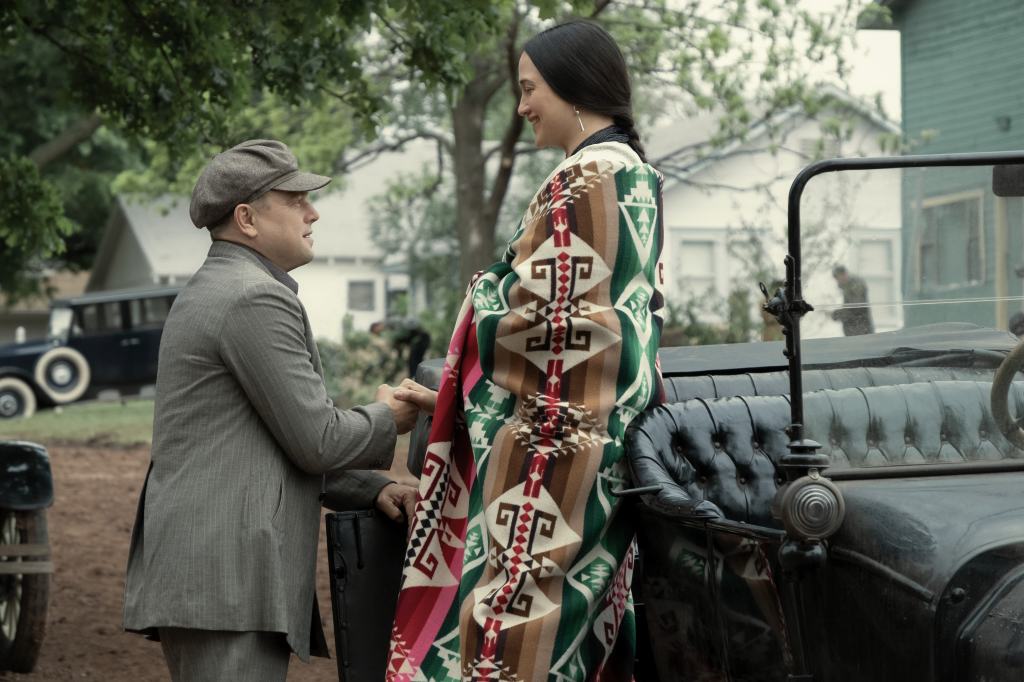Martin Scorsese’s Killers of the Flower Moon arrived in theaters late last month as a bundle of contradictions: a three-and-a-half-hour epic, rolled out from arthouses to IMAX stadiums, financed by one of the streaming companies whose main business model threatens the very movie-going experience that Scorsese holds dear.
But arguably an even greater tension exists between Scorsese’s singular talents and the needs of this particular story. Why is the director of gangster flicks like Goodfellas or Casino the right person to tell a story about the tragic history of the Osage nation? More pointedly, as some progressives have asked, does an old white guy have any business telling a story about Native American suffering?
Another director might have either rejected the premise of that question outright, or declined to take on the project at all. But Scorsese, no stranger to controversy, instead chose the harder middle way: reshaping the source material, in collaboration with Osage leaders, while maintaining the thematic concerns and stylistic hallmarks that have long graced his own work. The end result is a movie that anticipates objections but is not beholden to them, making Killers of the Flower Moon a model of sensitive and nuanced adaptation.
The film is based on David Grann’s 2017 bestseller of the same name, which recounts how the Osage nation—which was resettled on an oil-rich territory of Oklahoma in the late 19th century—were systematically murdered for their headrights in the 1920s. Grann’s book unfurls the plot piecemeal, gradually expanding the reader’s understanding of the conspiracy until an FBI lawman arrives to sort out the puzzle pieces and mete out justice. But Scorsese and screenplay co-writer Eric Roth have dispensed with the mystery, downplayed the investigation, and instead revealed the two main conspirators up front.
The pawn is Ernest Burkhart (Leonardo DiCaprio), an impressionable World War I vet newly returned from the frontlines. The king is his uncle William Hale (Robert DeNiro), who concocts a plot to murder and disenfranchise the Osage while posing as their kindly benefactor. And central to their scheme is Mollie Kyle (Lily Gladstone), the strong-willed Osage woman whom Ernest soon takes as his wife—even as he colludes in killing off her family.
The movie’s mystery lies not in who commits the crimes but how men like Burkhart and Hale rationalize, compartmentalize, or willfully deny their own complicity. DiCaprio plays Burkhart as a dimwitted naïf who slides into the murders through passivity and self-deception. Hale is the cold-blooded mastermind, but he’s played by DeNiro as a man who believes his own good intentions. Always covering his tracks with a smile, a handshake, and a sprinkling of Osage wisdom, Hale convinces all those around him—and maybe even himself—that he is a friend to the tribe even while eviscerating it.
Gladstone, though, is the heart and soul of the movie. She lends Mollie a quiet dignity and resolve that makes her husband’s betrayal all the more heartbreaking. With a knowing look or a whispered aside to a friend, Mollie clearly conveys her ambivalence toward Ernest’s motives, her awareness that he’s after money as well as love. But that awareness morphs into denial as a grieving Mollie wraps herself ever more tightly around Ernest. Gladstone’s magnetic performance turns this crime saga into a tragic portrait of trust misplaced and then betrayed.
In this poisoned romance, Scorsese finds a microcosm of the broader betrayal of the Osage. The movie depicts how the crimes of Hale’s gang were smoothed by law and local custom. From the legally mandated guardians who quietly pilfer their charges’ riches, to the glad-handing moonshiners who use alcohol as a means of social control, it took a village to enable the slaughter.
Through subtext and suggestion, the movie also places the plight of the Osage alongside other American tragedies. One subplot involves two doctors slowly poisoning the Osage through laced insulin, an echo of the infamous Tuskegee study that killed scores of black test subjects. Images from the 1921 Tulsa massacre recur as a parallel to the destruction of Osage life and property. Even the soundtrack suggests the parallel: In one of the film’s most haunting scenes, the blues legend Blind Willie Johnson wails over a fire-lit scene of Hale overlooking his cattle ranch and laborers, glowering like a demonic plantation owner.
Killers of the Flower Moon is aware of both the richness and tragedy of American history, yet never gives way to strident lecturing. Its resonance emerges suggestively from the story, not from the soapbox. But the same cannot be said of many of the film’s critics.
Amid the general praise for Scorsese’s latest, two predictably politicized critiques have emerged. From the left, some hold that Scorsese is simply too white to tell the story, as in the viral critique from actress Devery Jacobs, who argues the movie dwells on the atrocities committed by its white characters while glossing over the Osage as individuals. From the right, the countervailing charge is that Scorsese is too “woke.” Armond White’s National Review dissent claims that the movie “pits white reprobates against indigenous innocents” and that Scorsese “has been radicalized against America.”
Both arguments reveal a rather shallow engagement with the film. Scorsese painstakingly includes Osage perspectives through extended glimpses of tribal councils, religious rituals, and ceremonies, all of which reveal them as far more than victims. The violence itself is hardly sensationalized, often viewed from a distant remove which emphasizes the cold, brute reality of the act. Scorsese also reminds the viewer of his own limitations as a storyteller, most notably in a concluding coda which self-critically suggests how historical tragedies have typically been packaged for mass consumption.
As for the “woke” charge, it’s the reactionary flipside to the censorious impulse conservatives denounce elsewhere—namely, the urge to police who can tell which stories about America. Those who resent Scorsese for shedding an unflattering light on the American past do no favors to honest historical interpretation. It is not “woke” to acknowledge the dark side of Western expansionism; it’s merely good history.
Watching Scorsese’s latest, I was reminded of John Ford, another American master whose later films grappled critically, and imperfectly, with his earlier classics. Ford’s final Western, Cheyenne Autumn, was a rather clumsy attempt to foreground Native American perspectives that is ultimately burdened by the weight of its good intentions. Flower Moon could have similarly stumbled—and at times, it does show some strain. The film’s structure robs the story of some suspense, the final stretch brings some overwrought courtroom acting, and there’s anachronistic talk of “genocide” that briefly removes the viewer from its carefully cultivated historical realism.
On balance, though, Scorsese’s latest is a worthy tribute to its subject matter, one that faintly echoes John Ford’s last masterpiece, The Man Who Shot Liberty Valance. Like that film, Flower Moon is a ruminative reflection on Western history that preserves the best of the director’s talents while reconsidering which stories are told or forgotten.
I for one am grateful that we still have a living director who can be plausibly compared to John Ford. And I’m grateful that Martin Scorsese was willing to tell this American story at the twilight of his career—with an artistry all his own, and a wisdom that comes from those Osage who kept the flame alive over a century, when so much of the country wanted to look away.








Please note that we at The Dispatch hold ourselves, our work, and our commenters to a higher standard than other places on the internet. We welcome comments that foster genuine debate or discussion—including comments critical of us or our work—but responses that include ad hominem attacks on fellow Dispatch members or are intended to stoke fear and anger may be moderated.
You are currently using a limited time guest pass and do not have access to commenting. Consider subscribing to join the conversation.
With your membership, you only have the ability to comment on The Morning Dispatch articles. Consider upgrading to join the conversation everywhere.